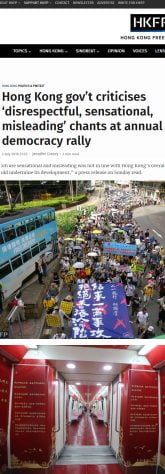I was at Hong Kong’s 2003 July 1 march – a massive display of public anger that stunned Beijing and toppled then-Chief Executive Tung Chee-hwa. Since then, the annual demonstration has become a predictable ritual in which the authorities torment the participants rather than the other way around.
 No doubt there are valid arguments in support of the gathering (here, for example). One might be that the Hong Kong government is so insecure and hyper-sensitive that it is still possible to provoke it. Hence the moderate hysterics over disrespectful slogans chanted at the weekend event. The official statement is stuffed with inane buzzwords that disrespect our intelligence:
No doubt there are valid arguments in support of the gathering (here, for example). One might be that the Hong Kong government is so insecure and hyper-sensitive that it is still possible to provoke it. Hence the moderate hysterics over disrespectful slogans chanted at the weekend event. The official statement is stuffed with inane buzzwords that disrespect our intelligence:
…”we care”, “we listen”, “we act” … proactively playing the role of “facilitator” and “promoter” to inject new impetus into society … since our return to the Motherland … implementing the ‘one country, two systems’ principle, ‘Hong Kong people administering Hong Kong’ and a high degree of autonomy in strict accordance with the Constitution and the Basic Law … we have to firmly uphold the ‘one country’ principle, have a correct understanding of the constitutional order as set out by the Constitution and the Basic Law, and safeguard the country’s sovereignty, security and development interests … Since the return to the Motherland [again] … world’s freest economy for 24 consecutive years … Belt and Road Initiative … Guangdong-Hong Kong-Macao Bay Area … opportunities … proactively [again] … The spokesman reiterated that chanting slogans which disrespect ‘one country’ and disregard the constitutional order or which are [oh, get on with it] sensational and misleading was not in line with Hong Kong’s overall interests and would undermine its development.
The last part presumably alludes to the pro-independence supporters on the march – the ‘i’ word sends officials into toxic shock – and to calls for an end to one-party dictatorship.
As with (“so-called”) independence, officials have acquired the phobia about mentioning one-party dictatorship from their Mainland masters. The latter declare it is illegal to chant such a slogan – though they ostensibly object to it not as counter-revolutionary but on semantic grounds. (Apparently it is a ‘false proposition’ as one-party dictatorship is not technically a feature of the People’s Republic of China’s system. Claiming otherwise probably hurts someone’s feelings.)
Of course, there is no law in Hong Kong today that prohibits the expression of an opinion – on independence, a one-party state, or anything. Mainland officials’ allergic reaction to certain words, faithfully emulated by the local puppets, suggests that at some stage certain ideas will be criminalized. An obvious way would be Communist-style anti-sedition legislation under Article 23 national security laws. Which brings us back to 2003.
Note the Hong Kong government’s adoption-by-stealth of Commie-speak, such as the phrase ‘correct understanding’ in the press release. (This trend could be a possible doctoral thesis for a linguistics/political discourse analysis scholar, one day.) Still to come in Hong Kong: an MTR version of the Xi Jinping-Thought New Era subway train, and nightly broadcasts of this totally non-creepy, heavily militaristic music video on members’ pledge to the Chinese Communist Party.

What happened to the celebratory fireworks this year? Have the great and good that used to curry favour by spending lavishly on 23 minutes of fireworks realised that there is little to celebrate?
I miss the word ‘resolutely’ as in ‘China will deal resolutely with counter-revolutionary blah blah blah……’
China isn’t a one party dictatorship since Xi now has control, for life, over all organs of the state. It is a one man dictatorship, and a Xi-man dictatorship at that.
I think it would be a lot simpler if the puppet administration enacted (or should that be inacted?) the “Prevention of Hurting the Feelings of the Chinese People (Xi Jinping) Ordinance”. This could then be a catch-all for anything deemed inappropriate by our new colonial masters.
Yes indeed, drafted n Sai Ying Pun perhaps?
“we have to firmly uphold the ‘one country’ principle, have a correct understanding of the constitutional order as set out by the Constitution and the Basic Law”